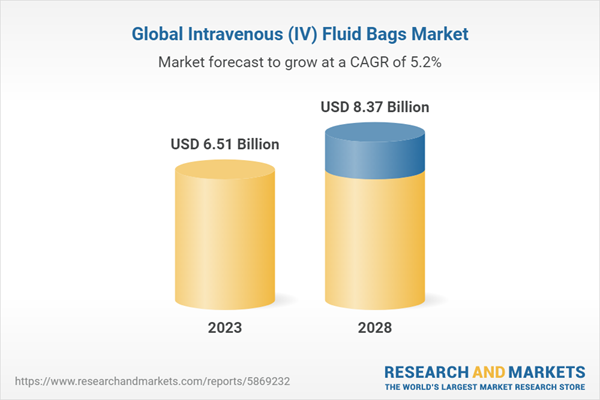IV fluid bags have evolved to be an integral component in the medical world, crucial for patient care across various clinical settings - from emergency rooms to post-operative recovery units. These bags, filled with solutions ranging from basic saline to complex nutrient solutions or medications, facilitate direct administration into the bloodstream, ensuring swift therapeutic action.
The growing global population, with its consequential rise in the number of patients and medical conditions, has expanded the intravenous (IV) fluid bags market size. The simplicity of the IV administration route, combined with its quick onset of action, has bolstered its preference among healthcare professionals for various treatments, including dehydration, malnutrition, or chemical imbalance rectification.
Furthermore, the technological advancements in IV fluid bags, such as the introduction of multi-chamber bags, light-protective bags, and eco-friendly materials, offer enhanced efficiency and safety in drug administration. The development of bags that maintain the stability of photosensitive drugs, or allow the concurrent delivery of multiple medications, underscores the market's commitment to evolving patient needs.
The widespread acceptance and integration of IV fluid bags across different medical branches significantly drive the intravenous (IV) fluid bags market growth. In chemotherapy, for instance, IV bags play a pivotal role, allowing precise dosing and safe delivery of potent drugs. In intensive care units, the use of IV bags to provide total parenteral nutrition to critically ill patients underscore their versatility and importance.
Beyond conventional clinical applications, the demand for IV fluid bags has seen a spike owing to their use in wellness clinics for hydration therapies and in combat zones or disaster-stricken areas where quick rehydration is paramount. This expansion in use-case scenarios further propels the intravenous (IV) fluid bags market demand.
Market Segmentation
The market can be divided based on fluid type, application, end-user, and region.Market Breakup by Fluid Type
- Normal Saline
- Dextrose
- Ringer’s Lactate
- Vitamins
- Others
Market Breakup by Application
- Clinical
Wellness
- Immunity
- Hangover Treatment
- Athletic Performance Improvement
- Others
Market Breakup by End-User
- Hospitals
- Hydration Centres/Clinics
- Home Care Settings
- Others
Market Breakup by Region
- North America
- Europe
- Asia Pacific
- Latin America
- Middle East and Africa
Competitive Landscape
The report looks into the market shares, plant turnarounds, capacities, investments, and acquisitions and mergers, among other major developments, of the global intravenous (IV) fluid bags companies. Some of the major key players explored in the report are as follows:- Baxter International, Inc.
- B. Braun Medical Inc.
- Fresenius Kabi AG
- Becton, Dickinson and Company
- ICU Medical, Inc.
- Others
About the Publisher
Acquire unparalleled access to critical industry insights with our comprehensive market research reports, meticulously prepared by a team of seasoned experts. These reports are designed to equip decision-makers with an in-depth understanding of prevailing market trends, competitive landscapes, and growth opportunities.Our high-quality, data-driven analyses provide the essential framework for organisations seeking to make informed and strategic decisions in an increasingly complex and rapidly evolving business environment. By investing in our market research reports, you can ensure your organisation remains agile, proactive, and poised for success in today's competitive market.
Don't miss the opportunity to elevate your business intelligence and fortify your strategic planning. Secure your organisation's future success by acquiring one of these reports today.
*The publisher always strives to provide you with the latest information. The numbers in the article are only indicative and may be different from the actual report.
Table of Contents
Companies Mentioned
- Baxter International, Inc.
- B. Braun Medical Inc.
- Fresenius Kabi AG
- Becton, Dickinson and Company
- ICU Medical, Inc.
Table Information
| Report Attribute | Details |
|---|---|
| No. of Pages | 140 |
| Published | August 2023 |
| Forecast Period | 2023 - 2028 |
| Estimated Market Value ( USD | $ 6.51 Billion |
| Forecasted Market Value ( USD | $ 8.37 Billion |
| Compound Annual Growth Rate | 5.1% |
| Regions Covered | Global |
| No. of Companies Mentioned | 5 |









